White House Rolls Out Its Economic Message
It was part economic talk show, part political tent revival.
The White House pulled out all the stops Wednesday as it convened a two-day conference to drum up support for restructuring Social Security, overhauling the tax code, curbing “lawsuit abuse” and enacting President Bush’s other second-term priorities.
Vice President Dick Cheney welcomed the participants and then sat almost wordlessly through a panel discussion on “The State of Our Economy.”
President Bush participated in an hourlong session called “The High Costs of Lawsuit Abuse.”
Treasury Secretary John W. Snow dangled the prospect of more tax cuts, and Health and Human Services Secretary Tommy G. Thompson bemoaned the high cost of medical care.
One after another, a hand-picked collection of economists, experts and business executives served up an unrelenting -- and unstinting -- series of testimonials to the wisdom of the president’s economic priorities. To a person, they urged the administration to do more of the same.
“Thank God the election is over,” said Mary Farrell, managing director of UBS Wealth Management of New York. “I have never seen so much economic misinformation and illiteracy out there in the marketplace. We have a wonderful economy.”
One thing the opening day was not was a frank exchange of ideas.
There was no hint of disapproval of Bush’s across-the-board tax reductions, which the president and many economists credited with stirring a recovery but which had also contributed to widening budget deficits. There was no criticism of Bush’s goal of allowing workers to divert some of their Social Security taxes into private accounts, which some analysts worried could weaken the public retirement program.
What passed for an off-message moment came during the litigation panel, when Yale University law professor George Priest described as “small steps” the president’s goal of curbing asbestos litigation, combating class-action lawsuits and capping financial awards to patients injured in medical malpractice cases.
A short time later, Bush good-naturedly set the record straight, saying that his plan amounted to “a huge step.”
And so it went.
In denouncing what he regularly derides as “frivolous and junk lawsuits,” Bush used some of his strongest language yet in making his case for passing limits on class-action, asbestos injury and medical malpractice cases.
“Those who have been hurt ought to have their day in court. But a judicial system run amok is one that makes it really hard for small businesses to stay in business,” Bush told several hundred people in a small auditorium in the Ronald Reagan Center, several blocks from the White House.
“If we can achieve legal reform in America, it’ll make it a better place for people either to start a business and/or find work,” he said.
The panel’s moderator, Commerce Secretary Don Evans, who announced his resignation in November, said frivolous lawsuits accounted for 2% of gross domestic product, or about $250 billion a year.
Critics of the president’s proposals have argued that the cost of such lawsuits is considerably less than that, and that frivolous suits rarely make it far enough in court to run up significant costs. They say some of the proposed curbs on litigation are meant to protect such interests as companies facing asbestos claims.
“President Bush’s economic plan pretends that taking away the legal rights of American families will reduce healthcare costs,” said Todd A. Smith, president of the American Assn. of Trial Lawyers, in a statement. “That’s not an economic plan. It is yet another giveaway to the insurance, drug, HMO and nursing home industries.”
In the Congress that just ended, the House passed limits on medical malpractice claims and on class-action suits. Those efforts died in the Senate. Republicans will have more members of both chambers in the next Congress.
Economists on the panels Wednesday declared the U.S. economy to be in fine shape, even though job creation had not caught up with population growth three years after the 2001 recession.
“The weakness that we worried about in the economy several years ago is now almost all gone,” said Harvard University economist Martin Feldstein, the White House’s leadoff speaker. “We really are seeing very strong economic performance.”
When administration officials asked conference participants for ideas and suggestions, they recited White House proposals: more tax cuts, limits on lawsuits, fewer federal regulations.
“From the moment you get out of bed in the morning, you’re regulated,” said George Mason University professor Susan Dudley, who said she would like to see the government do better cost-benefit analyses of regulatory initiatives.
Iowa dairy farmer Craig Lang said he wanted Washington to permanently repeal the estate tax, which he said had already cost his family substantial sums in estate planning expenses.
“I’d much rather spend that money to buy 250 more milk cows than to minimize the death tax,” Lang said.
In a panel on healthcare, participants promoted health savings accounts, a Bush initiative that would encourage individuals to purchase high-deductible catastrophic health insurance plans. While proponents say the plan could help more people buy insurance, some critics worry it could prompt employers to scale back on the health benefits they offer to workers.
The conference will continue today. Panel discussions include “Financial Challenges for Today and Tomorrow” and “Preparing for the Jobs of the 21st Century.” The president is scheduled to make closing remarks.
*
Reuters contributed to this report.
More to Read
Get the L.A. Times Politics newsletter
Deeply reported insights into legislation, politics and policy from Sacramento, Washington and beyond. In your inbox three times per week.
You may occasionally receive promotional content from the Los Angeles Times.










